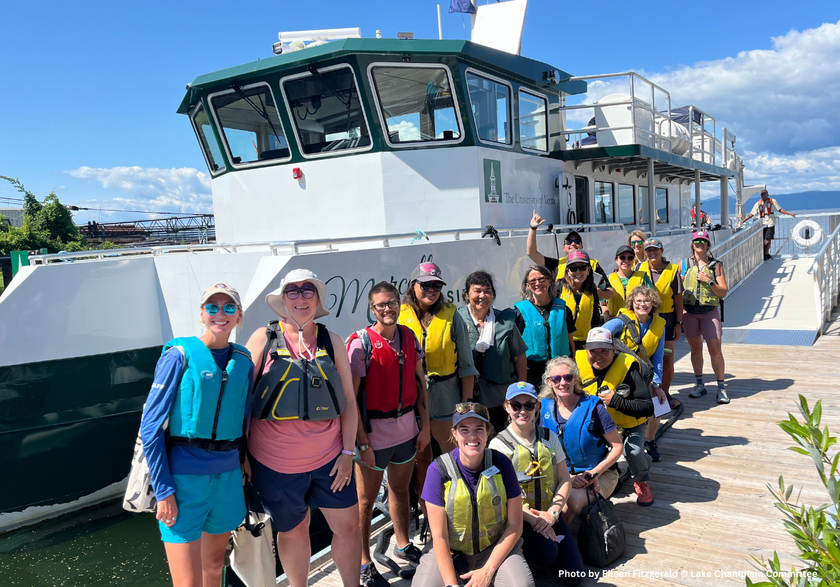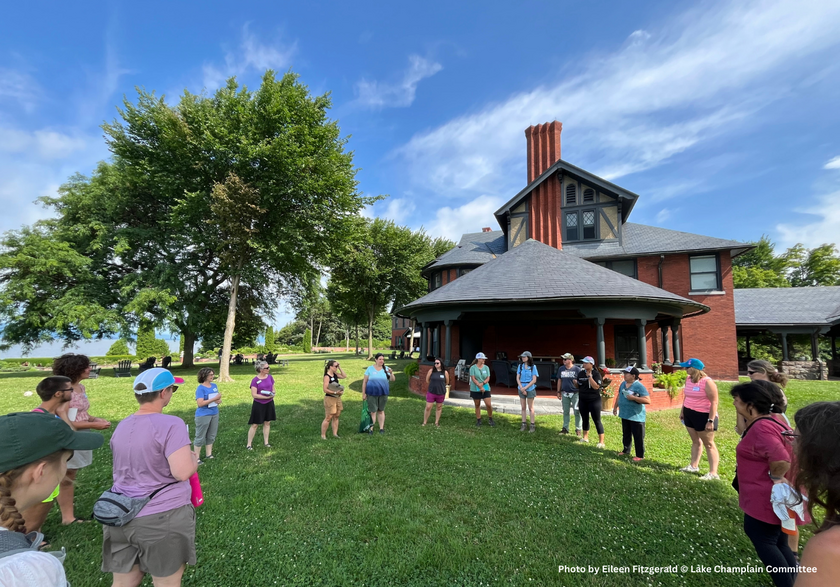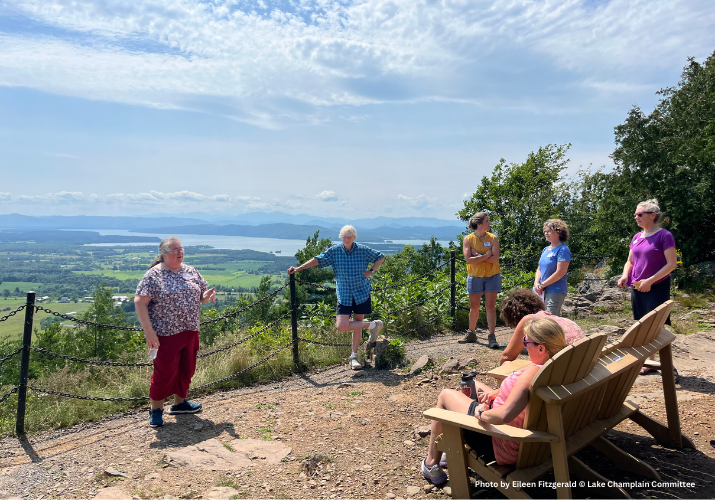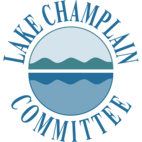A Watershed for Every Classroom
August 2024
The Lake Champlain basin is full of stories that educators can use to teach all subjects, engage students in learning about their community, and integrate content, service, and a sense of belonging to their home watershed. To delve into these stories with teachers, the Lake Champlain Committee and our partners in the Champlain Basin Education Initiative (CBEI) hosted a course called Watershed for Every Classroom (WEC). The place-based educational program in the Lake Champlain watershed is part professional development and part summer camp for teachers.
Place-based learning is an educational approach that immerses students in local landscapes and heritage as the foundation of curriculum. Rather than being introduced to ecology as an abstract concept, students go into the field to witness ecological interactions. WEC equips teachers with the skills and tools to take their students out in the Lake Champlain watershed and provide hands-on, engaging lessons about sustainability, geology, history, language, and more.

Through the WEC summer intensive LCC and CBEI partners took educators from the Lake Champlain Basin and Oahu, Hawaii on a four-day tour of the watershed. We explored Shelburne Farms’ shoreline and sustainable farming practices , hiked Mount Philo to delve into how geologic forces shaped the Basin and visited the Lake Champlain Maritime Museum to focus on geography, boat making, local history, and foster teamwork during a longboat excursion. Next the group trekked to Saranac Lake for an outing with the Adirondack Center for Loon Conservation that dove into ornithology, wildlife biology and climate change impacts on avian species. An overnight in the Adirondacks was followed by a morning monitoring the Ausable River for macroinvertebrates—mayflies and other aquatic insects are “indicator species” which are more sensitive to environmental stressors, so their presence indicates good water quality, and their absence can be a clue that something is wrong. The afternoon was spent at The Wild Center in Tupper Lake talking with a group of student activists about climate change and ways to teach about it. Then it was back to Vermont to voyage out to the Main Lake aboard the University of Vermont’s new research vessel Marelle Melosira to learn about microplastics and fish populations, tour teacher resources at the Rubenstein Laboratory and the Lake Champlain Basin Program’s Resource Room at the ECHO Leahy Center for Lake Champlain, and take a sail from the Community Sailing Center’s Burlington campus. The session wrapped up with teachers sharing how they will apply what they learned and left everyone with ideas for going outside to explore the Lake Champlain watershed with students when the school year commences

The through line of the four-day intensive and all the place-based lessons were the “big ideas of sustainability”:
- Community – A group of living and non-living things sharing a common purpose or space.
- Systems – Parts interconnected through larger patterns.
- Place – Natural and human communities together make up one’s space.
- Diversity -All systems and places function because of variety.
- Interdependence – All living things are connected. Every organism, system, and place depend on others.
- Cycles – Every organism and every system go through different stages.
- Change over time – All organisms, systems, and places are constantly changing.
- Limits – Every system has a carrying capacity.
- Equity – Resources are shared to meet the needs of living things across places and generations.
- Long-term effects – Actions have effects beyond immediate reactions.
- Equilibrium – A state of balance.
- Ability to make a difference – Everyone can change or impact a system, community, or themselves.
These ideas tied together seemingly disparate lessons to create a connected and cohesive picture of the Lake Champlain watershed.
Teachers synthesized what they learned in the course into “Unit Snapshots” or outlines of lesson plans that integrated the sustainability concepts for the Lake Champlain basin. Ideas ranged from exploring interdependence and the ability to make a difference through their school’s backyard pollinator field, to exploring diversity and community through biological monitoring of the Saranac River.

A fundamental principle of the WEC course and place-based learning is the importance of getting outside. Many people grasp ideas better outdoors than in a classroom. While field trips can be expensive and logistically challenging, most school grounds provide options that facilitate learning. You don’t have to venture to a nature preserve--you can learn about ecology and the principals of community and interdependence in vegetated areas near the school parking lot. All the places we visited for the Watershed for Every Classroom course are publicly accessible and make for excellent trips for learners of all ages to connect with the Lake Champlain basin. Shelburne Farms, the Lake Champlain Maritime Museum, the Adirondack Center for Loon Conservation, and ECHO’s Resource Room are all free to the public (call the Resource Room at (802) 864-1848 to schedule a visit); Mount Philo State Park and The Wild Center have parking and ticket costs respectively. Lake Champlain Sea Grant is offering guided trips on the Marelle Melosira research vessel this summer from New York and Vermont shores—tickets are $30 and available for booking here. The Community Sailing Center also has many opportunities for folks of all ages to get out on the water, from introductory sailing classes to more advanced offerings; learn more here.
Place-based learning should not end after school and we encourage folks of all ages and backgrounds to connect with the Lake Champlain watershed in their own way. If you’re an educator and want to bring the outside into your classroom, the Lake Champlain Committee has a roving native aquatic plant art show that includes fact sheets and large display photos of 15 native aquatic plants from arrowhead to yellow pond lily. We also have plant ID cards for use in the field. Please contact us at lcc@lakechamplaincommittee.org or 802 658-1414 if you’d like to help arrange a showing in your classroom or community space.
Lake Look is a monthly natural history and issues column produced by the Lake Champlain Committee (LCC). Formed in 1963, LCC is the only bi-state organization solely dedicated to protecting Lake Champlain’s health and accessibility. LCC uses science-based advocacy, education, and collaborative action to protect and restore water quality, safeguard natural habitats, foster stewardship, and ensure recreational access. Get involved by joining LCC via our website secure form (at www.lakechamplaincommittee.org), mailing your contribution (Lake Champlain Committee, 208 Flynn Avenue, Building 3, Studio 3F, Burlington, VT 05401), or contacting us at (802) 658-1414 or lcc@lakechamplaincommittee.org for more information.
